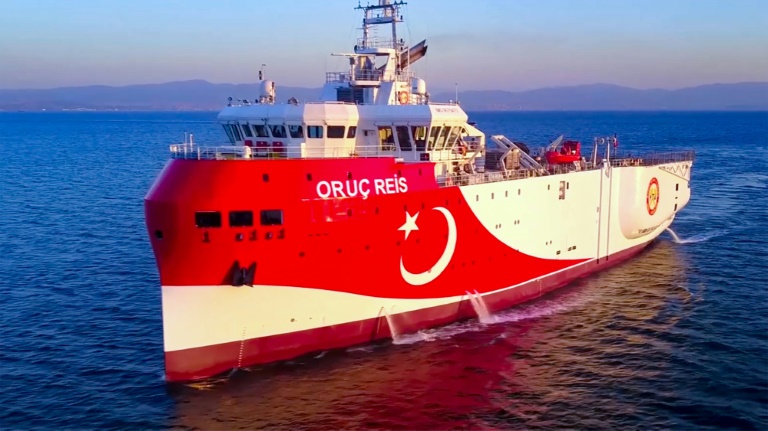
ISTANBUL - The Turkish research ship at the centre of a row with Greece over gas exploration in the eastern Mediterranean has left disputed waters where it was sent last month, according to ship-tracking websites and local media, in a move that could soothe spiralling tensions in the region.
The Oruc Reis research vessel backed by navy frigates deployed to waters near the Greek island of Kastellorizo on August 10 and their mission has been prolonged three times despite repeated protests from Greece and the European Union.
Ship-tracking websites marinetraffic.com and vesselfinder.com showed that Oruc Reis was off the coast of Turkey near Antalya on Sunday afternoon, confirming a report by pro-government Turkish newspaper Yeni Safak that Oruc Reis had returned to port.
Greek Prime Minister Kyriakos Mitsotakis hailed the apparent departure, which has not been confirmed publicly by Turkish authorities.
"This is a positive first step... I hope there will be more of them," Mitsotakis told reporters at a press conference in the Greek city Thessaloniki.
The vessel's deployment was not renewed by Turkish authorities after the end of its scheduled mission on Saturday, according to submissions on the NAVTEX website where countries issue navigational warnings for military deployments.
The decision not to extend the ship's mission was viewed as "a step towards giving diplomacy a chance," the Yeni Safak newspaper wrote, linking it to attempts to kickstart talks between Greece and Turkey, who are NATO partners.
Ankara and Athens have been locked in a row over energy resources in the region, which has pulled in the European Union and countries from far afield including the United Arab Emirates and war-torn Libya.
- NATO talks -
NATO said earlier this month officials from both sides had agreed to take part in technical talks to avoid accidents between their navies.
Athens denied this was the case, but the Turkish defence ministry said on Thursday that the first round of talks between Greek and Turkish military delegations took place at NATO's headquarters in Brussels.
While Turkey repeatedly said it was ready for dialogue without preconditions, Greece said there could only be talks once Ankara stopped making "threats".
Greek President Katerina Sakellaropoulou was on Kastellorizo on Sunday for the 77th anniversary celebrations of the island's liberation, where she said Ankara was "mounting pressure" on Athens.
"We are going through a difficult and dangerous period. The Turkish leadership... is undermining the peaceful coexistence that was built over many decades by Greeks and Turks, who saw the sea between them not as an impenetrable frontier but as a passage of communication," Sakellaropoulou said.
At the same time, Turkish Defence Minister Hulusi Akar was in the Turkish town of Kas which is opposite the Greek island, joined by military commanders.
Akar made no reference to Oruc Reis but told reporters that Ankara "was always supportive of dialogue and a political solution".
Leaders of seven European countries on the Mediterranean met at a summit last week in Corsica where they said they were ready to back EU sanctions on Turkey over the dispute.
Any action by Brussels will be discussed at a European Council summit on September 24 and 25.
France in particular sent naval forces to join Greece's military manoeuvres.
The crisis has added to a growing list of tensions between Turkey and Europe, notably over Ankara's military intervention in Libya, its policy in Syria and a crackdown on opponents of Erdogan at home.
Turkish President Recep Tayyip Erdogan on Saturday warned his French counterpart Emmanuel Macron "not to mess" with Turkey in the latest verbal salvo directed at Paris.
"Don't mess with the Turkish people. Don't mess with Turkey," Erdogan said during a televised speech in Istanbul.